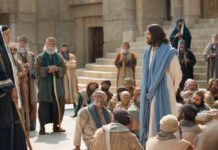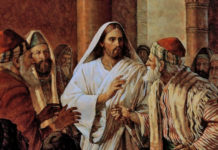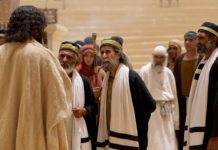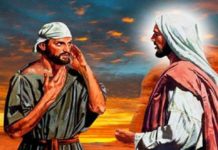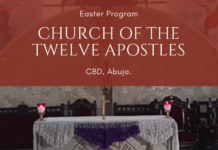FIRST READING
“Jesus, who was dead, but whom Paul asserted to be alive.”
A reading from the Acts of the Apostles (Acts 25: 13b-21)
In those days: Agrippa the king and Bernice arrived at Caesarea to welcome Festus. And as they stayed there many days, Festus laid Paul’s case before the king, saying, “There is a man left prisoner by Felix; and when I was at Jerusalem, the chief priests and the elders of the Jews gave information about him, asking for sentence against him. I answered them that it was not the custom of the Romans to give up any one before the accused met the accusers face to face, and had opportunity to make his defence concerning the charge laid against him. When therefore they came together here, I made no delay, but on the next day took my seat on the tribunal and ordered the man brought in. When the accusers stood up, they brought no charge in his case of such evils as I supposed; but they had certain points of dispute with him about their own superstition and about one Jesus, who was dead, but whom Paul asserted to be alive. Being at a loss how to investigate these questions, I asked whether he wished to go to Jerusalem and be tried there regarding them. But when Paul had appealed to be kept in custody for the decision of the emperor, I commanded him to be held until I could send him to Caesar.”
The word of the Lord
RESPONSORIAL PSALM Psalm 103:1-2.11-12.19-20ab (R. 19a)
R/. The Lord has fixed his throne in heaven.
Or: Alleluia.
Bless the Lord, O my soul,
and all within me, his holy name.
Bless the Lord, O my soul,
and never forget all his benefits. R/.
For as the heavens are high above the earth,
so strong his mercy for those who fear him.
As far as the east is from the west,
so far from us does he remove our transgressions. R/.
R/. The Lord has fixed his throne in heaven.
Or: Alleluia.
The Lord has fixed his throne in heaven,
and his kingdom is ruling over all.
Bless the Lord, all you his angels,
mighty in power, fulfilling his word. R/.
ALLELUIA John 14:26
Alleluia. The Holy Spirit will teach you all things and bring to your remembrance all that I have said to you. Alleluia.
GOSPEL
“Feed my lambs, tend my sheep.”
A reading from the holy Gospel according to John (John 21: 15-19)
When [Jesus had revealed himself to his disciples and] they had finished breakfast, he said to Simon Peter, “Simon, son of John, do you love me more than these?” He said to him, “Yes, Lord; you know that I love you.” He said to him, “Feed my lambs.” A second time he said to him, “Simon, son of John, do you love me?” He said to him, “Yes, Lord; you know that I love you.” He said to him, “Tend my sheep.” He said to him the third time, “Simon, son of John, do you love me?” Peter was grieved because he said to him the third time, “Do you love me?” And he said to him, “Lord, you know everything; you know that I love you.” Jesus said to him, “Feed my sheep. Truly, truly, I say to you, when you were young, you fastened your own belt and walked where you would; but when you are old, you will stretch out your hands, and another will fasten your belt for you and carry you where you do not wish to go.” (This he said to show by what death he was to glorify God.) And after this he said to him, “Follow me.”
The Gospel of the Lord
TODAY’S REFLECTION
Love is something to give and receive. It is good to love and allow yourself to be loved. One should dispose oneself to receive love. To love without having a disposition to receive love is selfishness. One can love without being lustful and receive love without defiling the body. Some people are so closed-up that they do not allow anyone to show them love. By this very gesture of Peter’s reassurance of his love to Jesus today, Jesus also shows through this encounter with Peter that one who loves should allow himself or herself to be loved. Do not resist love. To love is not enough, we should also allow ourselves to be loved.
